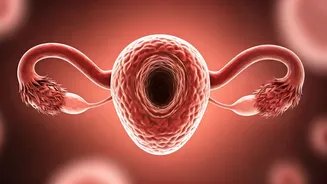Stress: The Silent Threat
Stress, often underestimated, wields considerable influence over women's reproductive systems. Its effects are not always immediate or obvious, which allows
it to quietly disrupt hormonal equilibrium and contribute to a variety of gynecological problems. Stress causes a surge of cortisol, the body's primary stress hormone, which can lead to irregular menstrual cycles, intensified PMS symptoms, and even fertility challenges. It interferes with the production of hormones such as estrogen and progesterone, pivotal in regulating the menstrual cycle and supporting overall reproductive health. Moreover, stress can affect the hypothalamus-pituitary-ovarian (HPO) axis, a critical hormonal pathway, thereby impairing ovulation and fertility. Chronic stress could also weaken the immune system, making women more vulnerable to infections. Addressing and managing stress is thus paramount to safeguarding women's reproductive health.
Hormonal Imbalance Unveiled
Stress profoundly affects the intricate hormonal balance in women, primarily through the elevation of cortisol. Elevated cortisol levels can trigger a cascade of hormonal imbalances. The increased cortisol can signal the ovaries to produce more androgens, potentially leading to acne and irregular periods. It also suppresses the production of gonadotropin-releasing hormone (GnRH), which is critical for the release of follicle-stimulating hormone (FSH) and luteinizing hormone (LH), thereby disrupting ovulation. Chronic stress and related hormone imbalances can also exacerbate premenstrual syndrome (PMS) symptoms, including mood swings, bloating, and breast tenderness. The disruption to these hormones can extend beyond the menstrual cycle and influence overall reproductive functions, increasing the risk of fertility problems or complications during pregnancy. Regulating cortisol and rebalancing hormones is crucial to alleviating the negative impact of stress on the reproductive system.
Gynecological Health Impact
Stress directly affects a woman's gynecological health, contributing to a range of complications. Chronic stress is linked to irregular periods, making it difficult to predict ovulation and fertility. Some women may experience amenorrhea (absence of menstruation) or oligomenorrhea (infrequent periods), both of which are common stress-related symptoms. Stress can also intensify the symptoms of premenstrual syndrome (PMS), significantly affecting a woman's emotional and physical well-being in the days leading up to her period. Furthermore, stress is linked to the exacerbation of conditions like polycystic ovary syndrome (PCOS), which is marked by hormonal imbalances, irregular periods, and infertility. It also increases the risk of pelvic inflammatory disease (PID) due to a weakened immune response, and can be related to painful intercourse (dyspareunia) and other sexual health issues. Addressing and managing stress is essential for promoting and maintaining gynecological health.
Effective Stress Management
Adopting effective stress management techniques is essential for preserving gynecological health. Regular exercise is one of the most effective strategies, as physical activity releases endorphins, which have mood-boosting effects, and help to lower cortisol levels. Mindful practices like yoga and meditation can calm the nervous system, reducing stress responses. Getting adequate sleep is crucial, as sleep deprivation escalates stress hormones; ensuring a regular sleep schedule of 7-9 hours helps the body to recover. Engaging in hobbies and enjoyable activities, such as reading, listening to music, or spending time in nature, also helps reduce stress. Consider joining support groups or seeking professional counseling to help manage stress effectively. Practicing these techniques can greatly improve overall well-being and protect the reproductive system from stress-related damage.
Lifestyle Adjustments for Well-being
Making lifestyle adjustments is critical in supporting gynecological health and mitigating stress's harmful effects. Maintaining a balanced diet is important; eating whole, unprocessed foods that are rich in nutrients can nourish the body and support hormonal balance. Limit the intake of caffeine and alcohol as they may intensify stress and disrupt sleep. Establish a routine and incorporate time for relaxation into your daily schedule. Prioritize time for activities that bring joy and reduce stress. Build a strong support network by maintaining healthy relationships with friends and family. Regularly monitor menstrual cycles to identify any irregularities and consult a healthcare provider for any concerns. By implementing these lifestyle adjustments, women can significantly improve their reproductive health and resilience to stress, promoting overall well-being.













